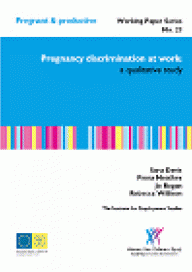Publications
 We author and publish a range of resources to keep you up to date with the latest developments in employment, labour market and human resource policy and practice.
We author and publish a range of resources to keep you up to date with the latest developments in employment, labour market and human resource policy and practice.
All our pdf publications are free to access.
Search results
-

Platform for Progression: Employer Training Pilots
Second Year Evaluation Report
Hillage J, Loukas G, Newton B, Tamkin P | Mar 2005 | Department for Education and SkillsThe Employer Training Pilots (ETP) were introduced in six Local Learning & Skills Council (LSC) areas in September 2002, initially for one year. They were subsequently extended for a second year a further six pilots were added. An initial evaluation report was published in November 2003 and this report presents an assessment of progress at the end of August 2004.
-
📄
Employment of Young People in Retail and Hospitality
Neathey F, Ritchie H, Silverman M | Feb 2005 | Low Pay CommissionThis publication is no longer available. In December 2003 the Low Pay Commission commissioned research focusing on the employment of young people in the retail and hospitality sectors. These sectors are both major employers of young workers and also include relatively high proportions of low-paying employers.
-

Fishing for Talent in a Wider Pool
Trends and Dilemmas in Corporate Graduate Recruitment
Barber L, Hill D, Hirsh W, Tyers C | Feb 2005 | Institute for Employment StudiesThis report presents the results from an audit of corporate graduate recruitment websites and 40 interviews in ten case-study organisations. The research examines whether graduate recruitment is meeting UK business needs and whether selection practices may discriminate against graduates from non-traditional backgrounds. It has key messages for employers, universities and careers advisors.
-

Recruitment and Retention of Teachers with Industrial or Professional Experience
Strebler M, Neathey F, Tackey N D | Feb 2005 | Learning and Skills Development AgencyThis is the report of the project on recruitment and retention of teachers with industrial experience and from other parts of the sector conducted on behalf of the Learning and Skills Development Agency (LSDA) by the Institute for Employment Studies (IES). The project aimed to investigate the strategies and practices used by colleges to attract, retain and develop teachers with current industrial experience or from other parts of the sector.
-

What Makes a Good Employer?
Rafferty AM, Maben J, West E, Robinson D | Feb 2005 | International Council of NursesThis document summarises underlying evidence and issues related to good human resource management in the health sector with reference to: indicators of performance and measurement of nursing outcomes; performance issues related to individuals and teams; and employee engagement, commitment and organisational citizenship behaviour.
-
📄
Providing Coaching Internally
A Literature Review
Carter A | Feb 2005 | Institute for Employment StudiesThis paper discusses the increasing use by organisations of the 'internal coach' and the associated advantages and disadvantages of this practice, as opposed to providing coaching from an external source. The author touches on issues that may arise, such as confidentiality, personality clashes and credibility. The paper also discourages the view that internal and external coaching are mutually exclusive practices.
-
📄
Employers and the New Deal for Disabled People - Qualitative Research, Second Wave
Aston J, Willison R, Davis S, Barkworth R | Jan 2005 | Department for Work and PensionsThe New Deal for Disabled People (NDDP) was a major labour market programme for disabled people who wanted to find work. It formed a key part of the government's Welfare to Work strategy. This report sets out the findings from the second wave of qualitative research with employers. At the time the research was carried out, NDDP had been operating nationally for two years.
-
📄
Graduate Employment Choices in the East Midlands
Pollard E, Williams M, Hill D, Hillage J | Jan 2005 | East Midlands Development AgencyHow many students and graduates flow through the East Midlands, studying in its ten higher education institutions and working in its companies? What do students and graduates think of the East Midlands, as a place to live and study and a place to work? What do they think are the advantages and disadvantages of the region? This study, commissioned by the East Midlands Development Agency, answers these questions and suggests actions that regional partners could take to encourage more graduates to work in the East Midlands. This publication is no longer available.
-

Pregnancy Discrimination at Work
A Qualitative Study
Davis S, Neathey F, Regan J, Willison R | Jan 2005 | Equal Opportunities CommissionThe findings of this study into pregnancy-related discrimination illustrate the breadth of issues that come up during working women's pregnancies and the common threads of their experience, in spite of different backgrounds.
-
📄
Pregnant Employees
Good Employer Practice
Robinson D, Newton L | Jan 2005 | Institute for Employment StudiesThis paper aims to: provide recommendations on the basis of current research; highlight the implications for employers; provide a summary of good practice for managing pregnant employees; and give details of how employers can avoid unintentional discrimination.
